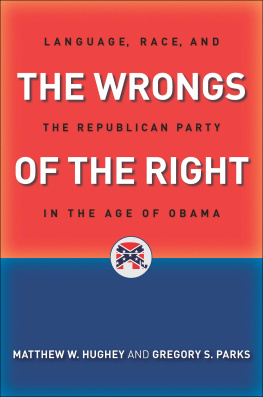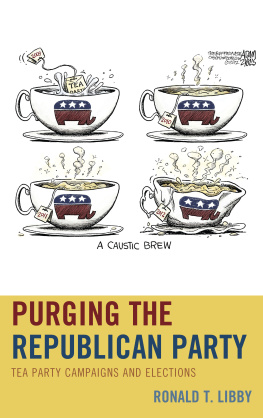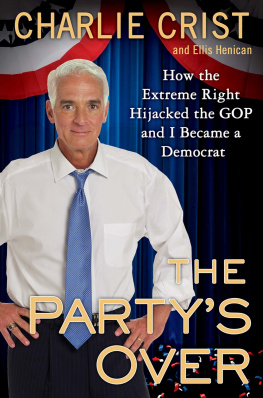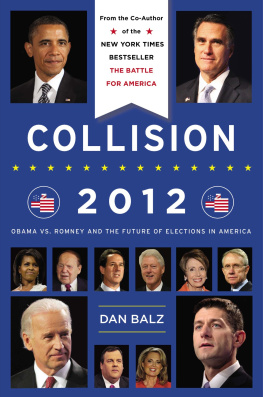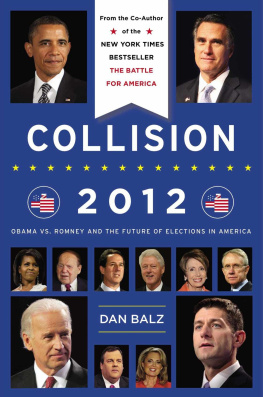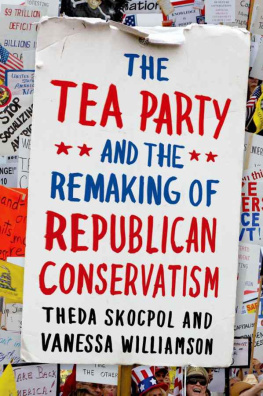Thank you for buying this ebook, published by NYU Press.
Sign up for our e-newsletters to receive information about forthcoming books, special discounts, and more!
Sign Up!
About NYU Press
A publisher of original scholarship since its founding in 1916, New York University Press Produces more than 100 new books each year, with a backlist of 3,000 titles in print. Working across the humanities and social sciences, NYU Press has award-winning lists in sociology, law, cultural and American studies, religion, American history, anthropology, politics, criminology, media and communication, literary studies, and psychology.
THE WRONGS OF THE RIGHT
The Wrongs of the Right
Language, Race, and the Republican Party in the Age of Obama
Matthew W. Hughey and Gregory S. Parks
NEW YORK UNIVERSITY PRESS
New York and London
www.nyupress.org
2014 by New York University
All rights reserved
References to Internet websites (URLs) were accurate at the time of writing. Neither the author nor New York University Press is responsible for URLs that may have expired or changed since the manuscript was prepared.
For Library of Congress Cataloging-in-Publication data, please contact the Library of Congress.
ISBN 978-0-8147-6054-3
New York University Press books are printed on acid-free paper, and their binding materials are chosen for strength and durability. We strive to use environmentally responsible suppliers and materials to the greatest extent possible in publishing our books.
Manufactured in the United States of America
10 9 8 7 6 5 4 3 2 1
Also available as an ebook
CONTENTS
ACKNOWLEDGMENTS
We are grateful to the many hands that helped bind this book. Our research assistants, Bianca Gonzalez-Sobrino, Rachel Lord, Kara Matejov, Michael Norsworthy, Janak Padhair, and Jennifer Skinner, were all a boon to our endeavor.
We remain indebted to our academic homes for providing the space and sustenance that helped bring this work to fruition. First, the research librarians at the University of Connecticut and Wake Forest University were most helpful guides. Second, our respective departments were instrumental in this books completion. At the University of Connecticut, we are thankful to Bandana Purkayastha (head of the Department of Sociology) and to William Jelani Cob (director for the Institute for African American Studies). At Wake Forest University, we are appreciative of Blake Morant (dean of the School of Law) for his unwavering support.
This book came to New York University Press through the foresight and assistance of Deborah Gershenowitz. Her keen editing and numerous conversations helped to redirect earlier drafts. The project then passed to Clara Platter, acquisitions editor for history and law, who has served as a windfall of support in terms of refining and polishing our final version. Constance Grady has served as a relentless assistant and resource for our every need and question. To the remainder of the people at New York University Press, its editorial board, its support staff, and the anonymous reviewers, we are most gratified by your backing and professionalism.
Introduction
On November 5, 2008, the nation awoke to headlines, such as that of the New York Times, that read OBAMA. Racial Barrier Falls in Heavy Turnout. For many, the near-prophetic election of an African American to the highest position in the land is a watershed moment that confirms the declining significance of both race and racism in the nation. Accordingly, a wide variety of activists, cultural critics, and political pontificators issued pronouncements to that effect. Just after the election, Adam Geller of USA Today wrote, The principle that all men are created equal has never been more than a remote eventuality in the quest for the presidency. [T]hat ideal is no longer relegated to someday. Someday is now. Approximately a year later, just after Obamas January 2010 State of the Union speech, MSNBCs Chris Matthews blurted out, I forgot he was black tonight for an hour. I said wait a minute, hes an African American guy in front of a bunch of other white people.
Despite the utopian proclamations that we now live in either a color-blind or a post-racial country, social-scientific research illuminates the grim reality that racial biases are more entrenched than ever. For example, white hate groups like the Ku Klux Klan have been on an unprecedented rise, which many scholars attribute to the outcome of the 2008 election. In early 2011, Donald Trump built a run for the Republican Partys presidential candidate almost exclusively on the racist and xenophobic notion that Barack Obama was not born in the United States and that his educational entrance to, and accomplishments at, Columbia and Harvard were neither merited nor authentic. By the fall of 2011, the Washington Post broke a story that GOP candidate Rick Perrys family rented Texas property with Niggerhead painted across a large rock that sat at the propertys gated entrance. By February of 2012, a federal judge sent an admittedly racist e-mail about Obama from his official courthouse e-mail account to several friends, and in June of 2012 the head of a Tea Party group in Arkansas stepped down after telling a racist joke at a political rally.
If all of these events are taken together, the core conclusion appears paradoxical. On the one hand, a positive change in dominant attitudes dislodges Jim Crow ideology and now calls for integration and equality. On the other hand, stereotypes of and prejudices toward African Americans pervade the populace. Thus, deep polarization over the appropriate social-policy response to racial inequality yields an ongoing legacy of tension and division.
In this book we set the post-racial claims into relief against a background of pre- and post-election racial animus directed at Barack Obama, his administration, and African Americans in general. In specific, we examine how racial fears, coded language, and explicit as well as implicit (automatic/subconscious) racism are drawn upon and manipulated by the political Right. Racial meanings are reservoirs rich in political currency, and the Rights replaying of the race card still serves as a potent resource for othering the first black president in a context rife with nativism, xenophobia, racial fatigue, and white backlash.
We pay particular attention to racial discourse among those on the political Right and to how that discourse is employed to oppose and hinder the presidency of Barack Obama. Certainly, this unprecedented opposition, if not obstruction, on the part of one political party toward a president of the United States might be seen as a result of the staunch opposition to his policies and the direction in which he points the country. Some, certainly many on the political Right, will argue that race is an insignificant issue in our supposed post-racial eraor that, if it is an issue, it is one that works to Obamas benefit. While American voters elected Obama president, some also cast a ballot as much for the washing away of what Condoleezza Rice termed Americas birth defect (slavery) and all that flowed from it. To counter this reading, we provide an analysis of the political Right and its opposition to Obama from the vantage point of its rhetoric, a history of the evolution of the two-party system and its relation to race, and social-scientific research on the relationship between race and political ideology. What we conclude is that while political conservatives may certainly disagree with Obamas policies, their disagreement does not seem to account for the outright hostility toward Obama expressed by both grass-roots conservatives and their political leaders. Accordingly, now Obama must govern a post-racial country that is anything butone in which the opposition party, from the bottom up, may be heavily influenced by race and racial animus toward Obama.


